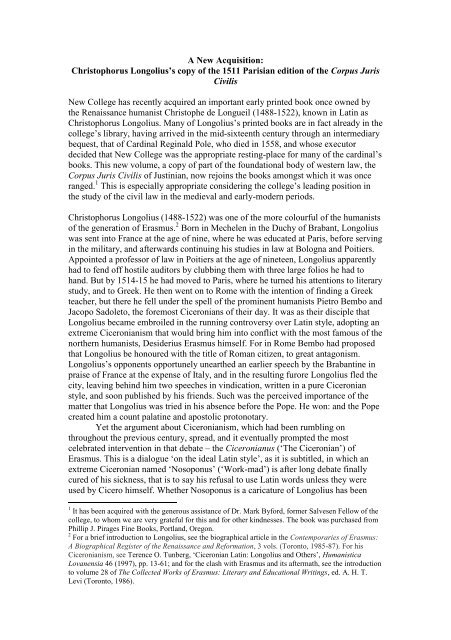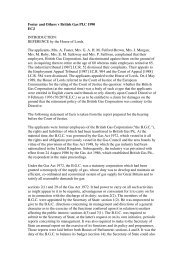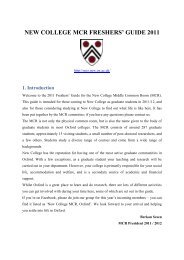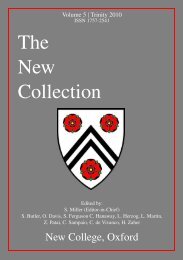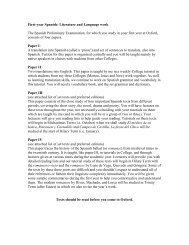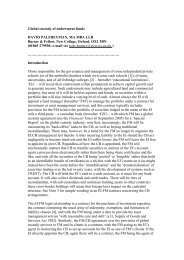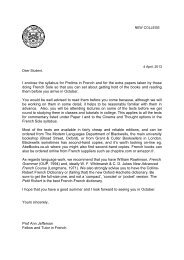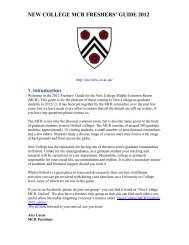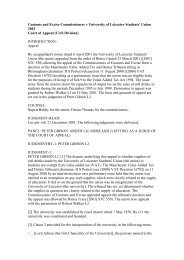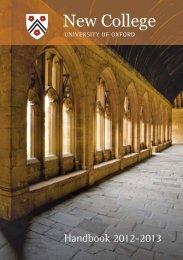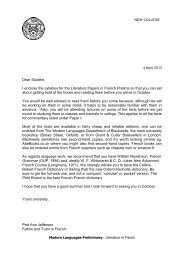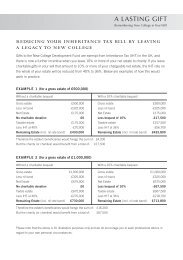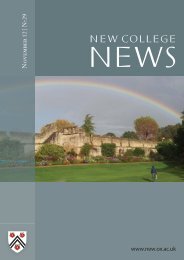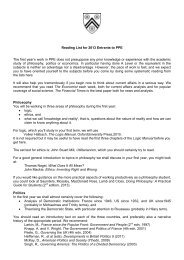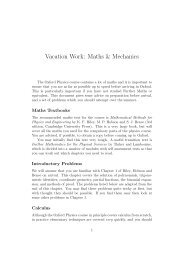4NCN9 Books from Longolius' library.pdf - New College
4NCN9 Books from Longolius' library.pdf - New College
4NCN9 Books from Longolius' library.pdf - New College
You also want an ePaper? Increase the reach of your titles
YUMPU automatically turns print PDFs into web optimized ePapers that Google loves.
incomplete, but Pole’s copy of Basil’s Hexameron in Latin is very likely Longolius’scopy, as is his copy of Cicero’s familiar letters, his Opera agricolationum, hisBlemmidas, his Nigrus, his Livy, his Tacitus, his Diodorus, his Procopius, his scholiaon the Iliad, his Philostratus, his Themistius, his Pliny, his Greek epigrams, and hisAppian; and it is specifically stated in the inventory that the copy of Cicero’srhetorical works in Pole’s <strong>library</strong> had been annotated by Longolius. Mention in the1555 list is made of a Josephus too, as in the <strong>New</strong> <strong>College</strong> Benefactors Book, whichsuggests that such a Longolius book was indeed once in the college’s possession,although it has long been lost.The number of ‘Langolius’ books in the college Benefactors Book waswoefully incomplete, and may well have been generated simply <strong>from</strong> the signaturesspotted on the copies themselves. The college actually holds (depending on how onecounts imprints) 25 of Longolius’s books – now, with the new volume, 26. Polehimself is recorded mainly as a donor of manuscripts, and only a handful of printedbooks. The Longolius books received by the college were evidently not the sum ofbooks surviving in Pole’s hands at his death. There are two more Longolius books inCorpus Christi <strong>College</strong>, Oxford, today, one being a collection of astronomical texts,the other of medical texts, this latter volume having been in the possession of theseventeenth-century Oxford archivist and antiquary Brian Twyne. There is also in theBodleian among the books of the twentieth-century collector Brian Lawn a furthervolume of humanist commentary with Longolius’s signature. 13 Furthermore, thecelebrated Vettius Valens astrological manuscript in the Selden collection in theBodleian Library (Arch. Seld. B 19) came <strong>from</strong> Longolius to John Dee, and is in facta copy in Longolius’s own hand. 14 And although I have not searched extensively, inthe early nineteenth century the leading bookseller Thomas Thorpe advertised at leasttwo books bearing Longolius provenances. One of these is obviously the astronomicalcollection now in Corpus Christi <strong>College</strong>; the other, a 1503 Xenophon and Herodian, Ihave not traced. 15What of the Longolius books in <strong>New</strong> <strong>College</strong>? A list of these was compiled byA. B. Emden and printed as one of the many appendices to the great twentieth-centuryedition of Erasmus’s complete correspondence. 16 I have re-edited and updated this listand present it as an appendix below. It is not obvious how Emden knew of all thesebooks, as the Benefactors Book could only have got him a third of the way, andEmden did not know of the 1555 Pole inventory. But for now we can make a few13 Lawn d. 29: Annotationes doctorum virorum in Grammaticos, Oratores, Poetas, Theologos, et Leges(Paris: Petit and Ascensius, 1511), with Longolius’s signature and a price of 16sch. The volume oncebelonged to Samuel Parr, the editor of Archbishop Ussher. Lawn wrote to <strong>New</strong> <strong>College</strong> to enquireabout the Longolius books, as his letter of 29 January 1992 is preserved with this book, as is the replyof 6 February <strong>from</strong> the <strong>library</strong>. As the reply notes, Lawn’s book and three of the <strong>New</strong> <strong>College</strong> volumesbear similar early shelf-marks, all starting with K. It seems possible that these stem <strong>from</strong> Pole’s <strong>library</strong>,as Lawn’s volume shows no sign of having ever been owned by the college.14 Julian Roberts and Andrew G. Watson, John Dee’s Library Catalogue (London: The BibliographicalSociety, 1990), M 43.15 Thomas Thorpe, Catalogue of an Extensive Collection of <strong>Books</strong> (London, 1830), no. 4847; Thorpe,Bibliotheca Selecta (London, 1836), no. 767, the latter being a copy of ‘Xenophontis omissa’ andHerodian, an Aldine edition of 1503, with the signature of Longolius and then of ‘Richard Morysine’.This is Sir Richard Morison (c.1510-56), the translator of Frontinus the military strategist, who couldeven have acquired this book in Padua, where he studied in the 1530s. There are six copies in Oxfordtoday (<strong>New</strong> <strong>College</strong>, Queen’s, Corpus, the remainder in the Bodleian), and given the other provenancestraced here, one of these may be the copy sought.16 Opus Epistolarum Des. Erasmi Rotterdami, ed. P. S. Allen, vol. 11 (Oxford, 1947), Appendix 28, pp.379-383.
asic observations. Longolius signed all of his books known to us – this is presumablyhow they were recognised in the first place – with an elegant signature followed by acalligraphic sign manual. He signed in Latin, but repeated in or shifted to Greek whensigning a Greek text. He usually recorded the price he paid for each book. He oftenannotated his texts, and on a few occasions he did so very heavily indeed. Given hisattitude to Cicero, it is unsurprising that the most densely annotated book of his in thecollection is certainly his edition of Cicero, and this copy would certainly repayfurther attention. Some of Longolius’s other titles have a bearing on hisCiceronianism, notably his copy of Castellesi’s De Sermone latino et modis latineloquendi. Interestingly, one of the <strong>New</strong> <strong>College</strong> Longolius books evidently did notcome <strong>from</strong> directly <strong>from</strong> Priuli, as it is signed by John Pryme, and this man was anElizabethan fellow of the college, who indeed donated the book among nine othertitles <strong>from</strong> his collection in 1596, as entered in the Benefactors Book (p. 42). Pryme,who had been born in Holywell parish in Oxford, and so very close to the college,‘became a noted puritanical preacher in the city of his nativity’, as Wood states, andpublished a handful of theological treatises and sermons in the 1580s. 17 We maywonder whether Pryme himself when he donated this book knew that it was, even atthat point, going to rejoin some old friends.The new volume:<strong>New</strong> <strong>College</strong>’s recently acquired Longolius book is a section of Justinian’s CorpusJuris Civilis, being the Complementum, or Volumen peculiari vocabulo dictum totiuslegalis sapientie, usually known as the Volumen Parvum, and containing the Novels(in the text known as the Authenticum), the three last books of the Codex (the treslibri, on Byzantine law), the books De feudis (actually a twelfth-century Lombardiccompilation), and the tract on the Peace of Constantine. 18 The edition was publishedin Paris by Jean Bonhomme, Jean Petit, and Thielman Kerver, completed 10September 1511, and features Kerver’s elaborate device on the title-page, as well as afine woodcut illustration of Victor Magnanimus distributing the law to his nobles andbishops. The printer and editor was the jurist André Bocard, a frequent printer of lawtexts, and the preface, addressed to Bocard, is by the scholar-printer Josse Badius(Jodocus Badius Ascensius). The book is complete in itself, and is not an odd volumeof a larger edition, although Bocard was in this period producing a run of the centralcomponents of the Justinianic corpus. 19 It is printed in red and black, and in themanner of such editions it presents the text surrounded on all sides by commentary, aneffect which is typographically pleasing to the modern eye, but which enraged thelegal humanists of the time, who wished such ‘cancerous’, ‘giant creeper’ growths tobe cut away. 20 There is no other copy in Oxford, and only two others are recorded in17 Wood, Athenae Oxonienses, vol. 1, cols. 652-53; given that Pryme died in 1596, these books mayreally have been a bequest.18 The Corpus Juris Civilis (which only acquired this collective title in the late sixteenth century) wasrecovered and published piece-meal in medieval and early-modern Europe in a complex fashion: forthe composition of the fifth book or volumen parvum see Peter Stein, Roman Law in European History(Cambridge: CUP, 1999), pp. 44, 61.19 For the impression, see the entry in Philippe Ernest A. Renouard, Bibliographie des impressions etdes œuvres de Josse Badius Ascensius (Paris, 1908), 3 vols, vol. 2, pp. 530-32; greatly expanded inRenouard, Imprimeurs & Libraires Parisiens de XVIe siècle (Paris, 1991), vol. 5, no. 38; H. M. Adams,Catalogue of books printed on the continent of Europe, 1501-1600, in Cambridge libraries(Cambridge, 1967), vol. 1, J-669. Some copies bear the mark of Jean Petit; some of Kerver; ours is ofthe latter group.20 Stein, Roman Law in European History, p. 76.
Britain, in the British Library and in Jesus <strong>College</strong>, Cambridge. Our copy is bound inmodern Italian quarter vellum over marbled boards. Longolius has as ever signed hisname. Indeed, he signs the page a number of different times, in Latin, Greek, and,unusually, in Hebrew lettering:This is in fact the only known Hebrew signature of Longolius. His first signature,with his elegant calligraph, is accompanied by Longolius’s customary mark of price,here 30½ sch, probably for ‘schillings’, a vernacular generalization of solidi, forwhichever modern currency Longolius paid, presumably in Paris (i.e. livres, sols anddeniers). Longolius then wrote his name in Greek, as ‘Christophoros Lōggolious’. Hethen wrote his name in Hebrew characters, and with accurate vowel-pointing,suggesting that he indeed gained some basic competence in this language. This is thenfollowed by a calligraph seemingly spelling out ‘Carlos’, and followed by similarGreek and Hebrew signatures for ‘Antōnios karolos’. These are all in Longolius’shand too, but I am unsure who this Antonius Carolus was. Given that all theseinscriptions are in Longolius’s hand, and given that this particular book quite likelyleft the company of Longolius’s other books before Pole inherited them, I suspect thatthe secondary signatures are presentation marks entered by Longolius for a friend.The text itself bears marginal annotation in two different hands, one certainly and theother possibly that of Longolius. I hope to provide a fuller description of thesemarginalia in a subsequent note, but for starters here is what the seller of the presentvolume provided in the catalogue description:The present item may have been one of the earlier books Longolius bought for
his <strong>library</strong>, as the date of publication coincides with the period of his legalstudies – the only moment in his life this book would have been of interest tohim – and with the time he was living in Paris. At the same time, themarginalia by Longolius suggest a mind more interested in linguistic andantiquarian matters than technicalities of the law. On folio 20 recto, forexample, a note corrects the spelling and discusses the unusual word“Brephotrophiorum,” and on folio 213 verso there are notes to a law thatprohibits “pantomimes” and “histrionics” [actually ‘histriones’, actors] inpublic porticos where the emperor’s image is displayed.William PooleFellow Librarian
Appendix:<strong>Books</strong> <strong>from</strong> the Library of Christophorus Longolius in the Library of <strong>New</strong><strong>College</strong>, Oxford 211. Columella, Varro, Cato and Palladius. Opera Agricolationum. Bologna:Benedictus Hector, 1 October 1494. Fol.BT1.27.2. Reversed calf.Signature on the title-page of Longolius in Latin and Greek, with a chronograph (?),and price of 36sts.2. Aurelius Cornelius Celsus. Medicina. Venice: Philippus Pincius, 6 May 1497.Fol.BT1.34.4(2).Annotated by Longolius, perhaps at two different times.Bound with nos. 6 and 13.3. Nicephorus Blemmidas. Logica with many other works by or attributed to Euclid,Hypsicles, Proclus, Aristarchus, Timeus, Cleonides et al. Tr. Georgius Valla.Venice: Simon Bevilacqua, 30 September 1498. Fol.BT1.30.3. Reversed calf.Signature of Longolius on the title-page, with price of 22sch.Contains marginal notes in his handwriting.4. Appian of Alexandria. De bellis civilibus. Venice: Christoferus de Pensis, 20November 1500. Fol.BT1.1.8(2).Signature of Longolius on the title-page, with price of 18sch.Three early cross-references to Pliny in Longolius’s hand.Bound with no. 7.5. Laurentius Valla. De expetendis et fugiendis rebus opus. Venice: Aldus Manutius,December 1501. 2 vols. Fol.BT1.1.5-6. Modern binding.Signature of Longolius on the title-page, very faded ‘emi’ inscription.Contains notes in his handwriting.6. Themistius. Paraphrasis in posteriora Aristotelis [et al.] … with Alexander ofAphrodisias. Enarratio de anima ex Aristotelis institutione. Venice: [SimoneBevilacqua], 14 July 1502. Fol.BT1.34.4(1). Reversed calf.Signature of Longolius in Latin on title-page, with price of 40sch.Annotated chiefly by Longolius, perhaps at two different times.Bound with nos. 2 and 13.21 This is a rewritten version of the list prepared by Emden and published in 1947, as explained earlier.Here we might comment too that the patterns of printed waste follow those of other <strong>New</strong> <strong>College</strong>books bound and rebound in the second quarter of the seventeenth century: nos. 1, 2, 3, 11 all have thesame waste and are bound in reverse calf; likewise 12, 18, 24 all have waste <strong>from</strong> the same Aristoteliancommentary, as witnessed in dozens of other books. See the note on Thomas Martin’s books for moreon this topic.
7. Flavius Philostratus. De vita Apolonii Tyanei with Eusebius contra Hieroclematque Tyaneum. Venice: Aldus Manutius, February 1502. Greek and Latin text.BT1.1.8(1). Late seventeenth/eighteenth-century binding; rebacked.Signature of Longolius on title-page, with price 38sts, and the note ‘sine Apiano quipost hunc sequitur’.Some notes by Longolius.Bound with no. 4.8. Florilegium Diversorum Epigrammatum. Venice: Aldus Manutius, November1503. 8°.BT1.127.7. C17/18 calf.Signature of Longolius in Greek on the title-page, with the price, also in Greek, veryfaded.Contains Greek notes in Longolius’s hand.9. Euclid. Opera. Venice: Joannes Tacuinus, 25 Oct. 1505. Fol.BT1.34.5. Modern marbled binding, rebacked.Signature of Longolius on title-page, and price of 11 or 40sch (i.e. xi or xl).Contains one note by Longolius to Book I.10. Diodorus Siculus. Opera, ed. Poggio Bracciolini. Paris: Jehan Petit, [1501-22].4o. It is possible that the second item in this volume, although the binding is later,came <strong>from</strong> Longolius: it is Macer Floridus, De viribus herbarum (s.l.: s.n., n.d.);there is some underlining and an annotation to sg. [Cviii]r.BT1.128.2(1). C17 calf, rebacked; English printed waste.Signature of Longolius on title-page, price of 8sch.Notes by Longolius, including an additional entry in the index on frogs <strong>from</strong> theclouds.11. Procopius. De Bello Gottorum. Rome: Johann Besicken. 20 June 1506. Fol.BT1.130.13(1). Reversed calf.Signature of Longolius on title-page, and ‘Emi XI. Julij s.’Bound with nos. 14 and 23.12. Caecilius Plinius Secundus. Epistolae. Milan: Alexander Minutianus, 18 January1506. Fol.BT1.45.3. Reversed calf.With signature of Longolius, and cost of 36sch. Longolius has also signed the lastpage.Some underlining and one annotation.13. Nicolaus Leonicenus. Libri Galeni e greca in latinam linguam translati. Venice:Jacobus Pentius, 10 May 1508. Fol.BT1.34.4(3).Annotated by Longolius.Bound with nos. 2 and 6.14. Procopius. De Bello Persico. Rome: Eucharius Silber, 7 March 1509. Fol.BT1.130.13(3).
Bound with nos. 11 and 23. Attached to the last page of the previous work is an oldtitle-tab, ‘Procopius de Bello Persico’.15. Titus Livius. Decades. Paris: Badius Ascensius for Jehan Petit, 15 March, 1510.Fol.BT1.2.2. C17/18 calf.Signature of Longolius, with price of 25sch.Some marginalia in Longolius’s hand, but some in another hand, e.g. fols. CLIv-CLIIr.16. Marcus Tullius Cicero. Opera rhetorica, amatoria et forensia. Paris: Jehan Petitand Badius Ascensius, 22 November 1511. Fol.BT1.24.8. Half leather with comb marbled paper, rebacked.Signature of Longolius on sg. +iir, with cost of 42s 6d; very heavily annotated.Bound with no. 17.17. Marcus Tullius Cicero. Orationes. Paris: Jehan Petit, 22 November 1511. Fol.[Really a continuation of previous with new signatures.]Bound with no. 16.18. Curius Lancilottus Pasius. Emendatum Quadringentis in locis. Parma:Franciscus Ugoletus & Octavianus Saladus, 15 July 1514. Fol.BT1.39.9. Reversed calf.Signature of Longolius on title-page, with cost of 8 den.19. P. Cornelius Tacitus. Libri Quinque noviter inventi atque cum reliquiseius operibus editi. Rome: Stephanus Guilleretus, 1 March 1515. Fol.BT1.46.3(1). Reversed calf.Signature of Longolius on the title-page, with ‘Emi duodecem denariis’Many notes.Bound with no. 21.20. Basil. Opera. Rome: Jacobus Mazochius, 15 September 1515. Fol.BT1.39.6(2).Bound with no. 22.21. Adriano di Corneto (Castellesi). De Sermone latino et modis latine loquendi.Rome: Marcellus Silber, October 1515. Fol.BT1.46.3(2).Notes in Longolius’ hand.Bound with no. 19.22. Basil. Hexameron, per Joannem Argyropolum e Greco in latinum conuersum.Rome: Jacobus Mazochius, 12 Dec. 1515. Fol.BT1.39.6(1). C17/18 calf.Signature of Longolius on title-page, with ripped price inscription.Contains a few marginalia by Longolius.Bound with no. 20.
23. Agathius. De Bello Gotthorum. Rome: Jacobus Mazochius, 29 February 1516.Fol.BT1.130.13(2).Bound with nos. 11 and 14.24. Stephanus Niger. Dialogus. Milan: Alexander Minutianus, 31 March 1517. Fol.BT1.45.2. Reversed calf.Signature of Longolius on title-page, with ripped price inscription of ‘x …’A few notes, with some Greek.25. Scholia of Chalcenterus Didymus on Homer. Rome: Augustus Kollotius, 7September 1517. Fol.BT1.35.3(2). C17/18 calf.Signature on Greek on title-page, with purchase inscription also in Greek for 11 (iotaalpha);also ‘Liber <strong>College</strong>i teste Johannes Pryme’. This was indeed one of nine titlesentered in the Benefactors Book (p. 42) as donated by John Pryme in 1596.Contains a few notes in Longolius’s hand.


